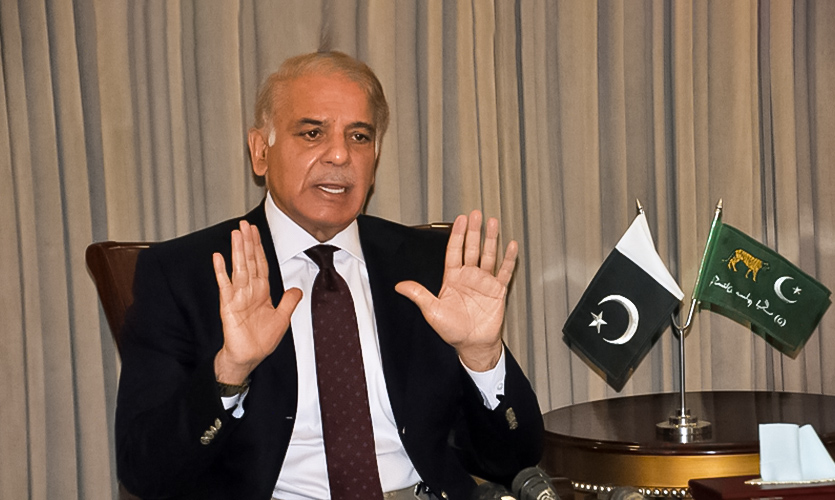Speaking at an event on Saturday, Pakistani Prime Minister Shehbaz Sharif said that “war is not an option” for either India or Pakistan, in order to maintain peace in the South Asian region. Sharif also emphasised on the significance of “peace talks” to resolve issues, including the dispute on Jammu and Kashmir.
“We want permanent peace with India through dialogue as war is not an option for either of the countries,” he said.
Sharif, who took over charge of Pakistan from Imran Khan following a bitter standoff, said that sustainable peace in the region was linked to solving the Kashmir issue as per the United Nations’ (UN) resolutions.
This is the second time in a week that Sharif raised Kashmir. Earlier last week, on Thursday, in a meeting with newly appointed Australian High Commissioner to Pakistan Neil Hawkins, Sharif said that the “desires” of the Kashmiri people are important to maintain peace in the region. He also stressed that the world community must interfere and play a facilitative role in the Kashmir issue.
In his maiden address to the nation, in May, the Pakistani PM had said that talks with India can only be possible if New Delhi revokes its decision on Article 370, and restores the statehood of Jammu and Kashmir.
Pakistan broke off its diplomatic ties with India and expelled the Indian envoy in Islamabad after the Narendra Modi-led central government abrogated Article 370 in August 2019. The Imran Khan government at the time brought India’s move to the attention of the UN, and raised the Kashmir issue at international platforms several times, but remained unsuccessful.
Relations between India and Pakistan have always been inflexible and conflictual due to various issues, including cross border terrorism and Pakistan’s occupation of Kashmir.
India has always rubbished Pakistan’s concerns on Kashmir, and categorically said that except cross border terrorism there is no issue between both countries. For India, cross border terrorism has always been a central issue and thus, New Delhi has always warned Pakistan that ties between both countries cannot be improved unless this problem is solved. India has maintained that Jammu and Kashmir was always an integral part of India, and that it will continue to remain so.
Additionally, during his address, Sharif praised the Sino-Pak relationship, and said that both countries have achieved new heights, especially after signing the China-Pakistan Economic Corridor (CPEC) agreement.
In a candid conversation with the students of Harvard University, Sharif had said that there is no competition between the neighbouring countries except in the sector of trade, economics, and improving their people’s well–being. For India, trade and terror cannot go together, but the Commerce Ministry’s latest data shows that both countries have done a healthy job in this regard. According to government data, India’s export to Pakistan rose to $142 million during the period of April-May, which was more than double compared to last year’s $70 million. The data clearly indicates that despite the trade ban, both countries have maintained their trade relations.
Defending its nuclear assets and army, the Pakistan PM further said that the country has spent more on its military resources to only protect its borders, and not to provoke anyone.
Pakistan, the fifth largest country in the world in terms of population, is actively seeking to improve its ties with India over the past couple of months. According to a report, Pakistan has been engaged in a “backchannel” with India since December 2021, in order to resolve all crises and resume talks on all issues.
According to media reports, the relevant officials from both sides have been in touch, and have met at least four to five times in the Western and Gulf countries, to normalise the ties. During the meetings, both the countries have reportedly talked on key issues such as cross border terrorism, Kashmir, ceasefire, and trade.
Pakistan’s eagerness to talk to India has become quite apparent, possibly because it wants the Indian government to revoke its August 2019 move, and not change the demography in Kashmir.
According to the Express Tribune, Pakistan wants India to take steps regarding Kashmir before any normalisation of relations begins. New Delhi, however, is more interested in exploring the option of resuming bilateral trade in Islamabad first.
Last month, in July, it was expected that External Affairs Minister Dr S Jaishankar and his Pakistani counterpart Bilawal Bhutto Zardari may meet during the Shanghai Cooperation Organisation (SCO) conference in Tashkent. However, no such talks took place.
During his address to the SCO, Dr Jaishankar asserted that the implementation of a “zero tolerance” policy for terrorism, in all its manifestations, is a “must”, which was seen as a veiled message to Pakistan.
The peace talks between India and Pakistan are at a standstill for now due to political instability in Pakistan, but sources say that both countries may resume talks within the next couple of months.
In a major development last year, during the backchannel talks, India and Pakistan agreed to ease their military aggression at the Line of Control (LoC), and issued a rare joint statement accepting “strict observance” of the 2003 ceasefire pact. No major offensive has been seen from both sides along the LoC ever since.
Read more: Centre Rejects Union Minister ‘s Claims To Shift Rohingyas To EWS Flats In Delhi










